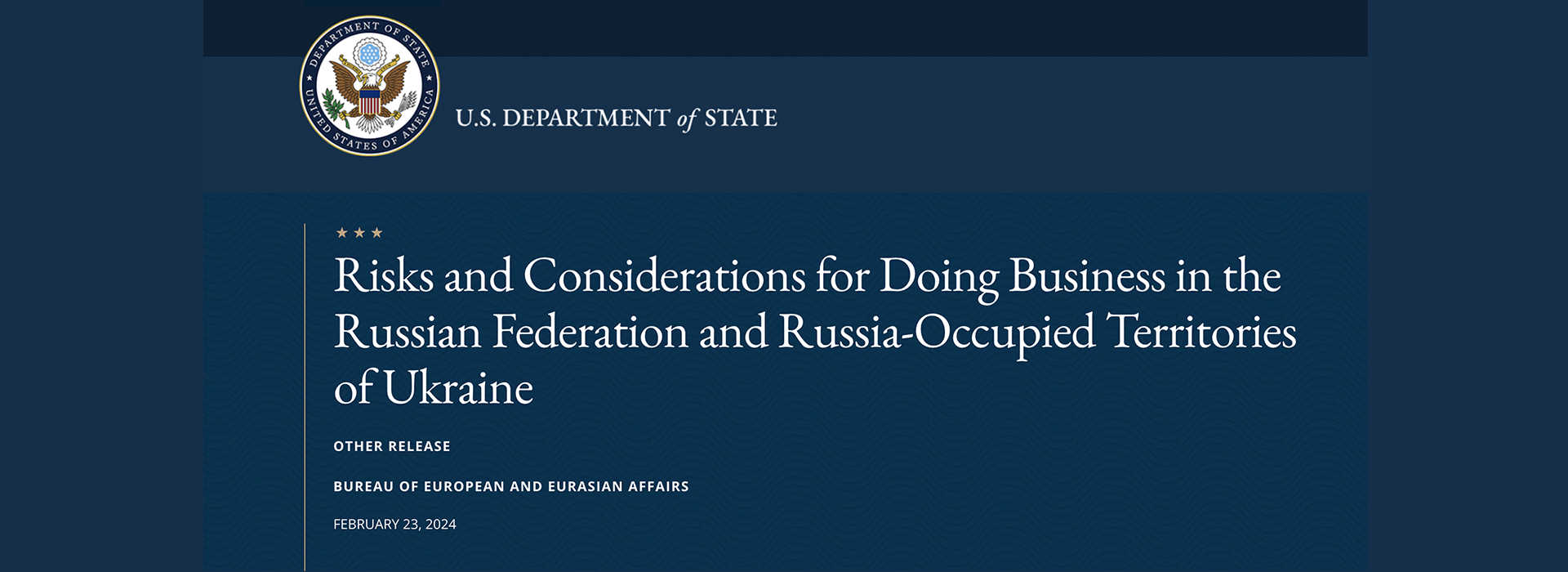Summary
The United States assesses that doing business in the Russian Federation and in Russia-occupied territories of Ukraine poses serious legal, financial, and reputational risks. Russia’s kleptocratic environment undermines fair competition and the rule of law, making businesses susceptible to extortion, property seizures, and U.S. law enforcement action. Businesses increasingly risk severe civil and criminal penalties in navigating the raft of economic sanctions, export controls, and import restrictions imposed on Russia by the United States and its allies and partners. In addition, businesses are being forced to cooperate in Russia’s military mobilization and could be implicated in Russia’s commission of war crimes and crimes against humanity as part of Russia’s brutal war against Ukraine. The serious risks stemming from this operating environment may be mitigated by rigorous due diligence, though substantial risk is likely to remain.
The United States, along with its allies and partners, is aiding Ukraine in defending itself and imposing unprecedented sanctions to reduce the Government of Russia’s ability to carry out its illegal war. This includes sanctions on individuals and entities across the economy and government, including by designating financial institutions and sanctioning Russia’s sovereign wealth fund. Sanctions, export controls, and other economic measures such as the price cap on oil and petroleum products aim to reduce current and future revenue to the Government of Russia, without disrupting exchanges that benefit ordinary Russians or markets for energy, agricultural and medical products, and other essential commodities. While our sanctions are not intended to impact the people of Russia, these measures seek to impede the Russian government’s imports of components, technologies, and other inputs to and transactions with its defense sector, as well as to disrupt Russian sanctions evasion. In addition, U.S. sanctions promote accountability for Kremlin-linked Russian elites and other malign actors involved in human rights abuses and funding its war.
Although any decisions—including whether and how to continue operations, suspend commercial operations, or exit the Russian market, in accordance with applicable statutory and regulatory requirements—are ultimately up to businesses, individuals, and organizations, the U.S. government wants to highlight risks associated with doing business in or linked to the Russian Federation or the areas it occupies in Ukraine.
The U.S. Department of State (“State”), the U.S. Department of the Treasury (“Treasury”), the U.S. Department of Commerce (“Commerce”), and the U.S. Department of Labor (“DOL”) are issuing this business advisory to help ensure that businesses, individuals, and organizations have the information necessary to inform their considerations regarding the range of heightened risks associated with doing business in or engaging in transactions involving the Russian Federation or Russia-occupied territories of Ukraine. This includes business activities that involve the Russian military-industrial base that may not otherwise directly addressed by sanctions, export controls, or other trade restrictions.
Businesses, individuals, financial institutions, and other persons—including investors, consultants, non-governmental organizations, and due diligence service providers that operate in or have value chains linked to the Russian Federation or the areas it occupies in Ukraine (hereafter “businesses and individuals”) face significant operational, legal, economic, and reputational risks associated with their Russian business operations and relationships. Conducting heightened due diligence can, in many cases, help to reduce or mitigate these risks and facilitate increased transparency to all stakeholders regarding such risks (see Annex: Due diligence recommendations for businesses and individuals).
The specific categories of risks for businesses and individuals regarding Russia and its unlawful invasion and occupation of parts of Ukraine highlighted in this advisory are:
- Risk of businesses and individuals becoming exposed to sanctions, export controls, import prohibitions, money laundering vulnerabilities, and corruption;
- Risk of businesses and individuals being implicated in the Government of Russia’s violations of international law, including war crimes and crimes against humanity, and human rights abuses; and
- Risk to businesses and individuals due to the proliferation and implementation of repressive laws in the Russian Federation and the areas of Ukraine it occupies, including measures authorizing expropriation in certain instances or detentions based on spurious grounds.
In response to risks of this nature in the Russian Federation and the occupied regions of Ukraine, businesses and individuals are encouraged to conduct heightened due diligence, incorporating both a robust review of compliance mechanisms (compliance due diligence) and heightened human rights due diligence, as methods for limiting their exposure. (See the Annex for more information and resources).
Risk of businesses and individuals becoming exposed to sanctions, export controls, import restrictions, money laundering vulnerabilities, and corruption; compliance due diligence to mitigate such risks.
Sanctions
To curtail the Government of Russia’s ability to continue its war against Ukraine, State and Treasury’s Office of Foreign Assets Control (OFAC) have utilized sanctions to block and immobilize assets of thousands of individuals and entities, prohibit new investment in Russia and the provision of certain services, and ban certain imports of Russian goods, among other restrictions. These sanctions are in addition to existing Russia/Ukraine-related sanctions following the invasion of Crimea, including a comprehensive trade embargo on Crimea and the Donetsk People’s Republic (DNR) and Luhansk People’s Republic (LNR). Please see the OFAC Russia-related sanctions webpage for more information.
Businesses and individuals remaining directly or indirectly in the Russian market should understand the sanctions risks of their activities and any applicable exemptions or authorizations. Unless authorized by a general or specific license issued by OFAC, or exempt, OFAC’s regulations generally prohibit all transactions by U.S. persons or within (or transiting) the United States that involve any property or interests in property of designated or otherwise blocked persons. In addition, persons that engage in certain transactions with the individuals designated may themselves be exposed to designation.
Export Controls
Since February 24, 2022, the U.S. Department of Commerce, Bureau of Industry and Security (BIS) has implemented a series of stringent export controls restricting Russia’s access to items subject to the Export Administration Regulations (EAR) that Russia needs to sustain its military activity in Ukraine. Among other things, these controls restrict the export to, re-export to, or transfer within Russia or Belarus of:
- More than 600 categories of dual-use goods, software, or technology classified by Export Control Classification Number (ECCN) on the Commerce Control List;
- Over 3,000 categories of goods identified by six-digit Harmonized System (HS) codes (including machinery, electrical equipment, microelectronics, aircraft parts, among other commercial and industrial goods, and luxury goods used by Russian elites); and
- Other categories of chemicals, chemical precursors, biologics, laboratory equipment and consumable materials, along with items related to quantum computing, as identified in the EAR.
Related to the Government of Russia’s invasion, BIS has also added over 800 entities to its Entity List, restricting exports, re-exports, and transfers of all items subject to the EAR when these entities are a party, including more than 600 in Russia, 30 in Belarus, and 200 in 33 other countries. BIS has also issued three new foreign direct product rules (FDPR) that control certain items that are produced using controlled U.S. tools, software, or technology, even when made outside the United States. These FDPRs cover more than 600 categories of dual-use items classified by ECCN; 14 categories of items identified by six-digit HS codes, most notably microelectronics used in Russian and Iranian drones and unmanned aerial vehicles when destined for Russia, Belarus, or Iran; and all items when destined to the hundreds of entities identified as Russian or Belarusian military end users on BIS’s Entity List.
These recent BIS actions build on export restrictions that the United States established following Russia’s occupation of Crimea in 2014 and in response to other malign Russian activities. Some of these prior restrictions remain in effect, while others have been expanded in scope through BIS’s recent regulatory actions. These actions have imposed controls on a range of items subject to the EAR that had not previously required export licenses when destined for Russia or Belarus.
BIS has also released, on its own or in conjunction with interagency and international partners, several joint alerts, compliance notes, and guidance documents for businesses and individuals on complying with export controls related to Russia and Belarus, red flag indicators, and best practices.1 As a result, businesses and individuals should examine and mitigate the high levels of risk attached to financial transactions with Russia. Further information on due diligence is available in the Annex.
Import Prohibitions
The U.S. Government has also utilized sanctions and regulatory controls to prohibit the importation into the United States of Russian origin crude oil and petroleum products, coal, gold, alcoholic beverages, as well as specific diamonds and diamond products, and fish and seafood products.
Money Laundering and Corruption
Businesses with proximity to the Russian market, Russian enterprises, or oligarchs should be aware of the heightened risk of money laundering and financial crimes associated with the Government of Russia’s invasion of Ukraine. Businesses operating in environments of state capture may be pressured to pay bribes to foreign officials, which in some circumstances violate the Foreign Corrupt Practices Act – exposing the company and its officers, employees, third-party agents, and others to legal liability.
Treasury’s Financial Crimes Enforcement Network (FinCEN) has also identified material risks of Russian illicit activity targeting the U.S., publishing alerts for U.S. financial institutions highlighting illicit activity typologies and reporting obligations regarding potential Russian sanctions and export control evasion, particularly in high-risk sectors. Businesses and individuals can utilize these FinCEN Alerts2 to examine and mitigate the high levels of risk attached to financial transactions with Russia.
Compliance Due Diligence
Businesses and individuals are encouraged to conduct due diligence to reduce the risks associated with violating laws and regulations relevant to the above issues. This includes conducting a thorough investigation, audit, and/or analysis of a counterparty’s legitimacy and compliance with applicable laws and regulations, as well as reviewing guidance issued by both governmental and non-governmental regulatory bodies. Further information on due diligence is available in the Annex.
Risk of businesses and individuals being implicated in Russia’s violations of international law, including war crimes and crimes against humanity, and human rights abuses.
The Russian Federation has engaged in violations of international law and abuses of human rights. The UN General Assembly has condemned Russia’s invasion as a violation of international law, and investigations conducted by the UN and prominent media outlets have documented the government’s violations of international humanitarian law, as well as its failure to respect human rights and fundamental freedoms.
Businesses and individuals face a range of broader risks related to the Government of Russia’s violations of international law and human rights abuses. Conducting due diligence, consistent with the UN Guiding Principles on Business and Human Rights (UNGPs), the OECD Guidelines for Multinational Enterprises on Responsible Business Conduct (“OECD Guidelines”), the UN Development Program’s (UNDP’s) “Heightened Human Rights Due Diligence for Business in Conflict-Affected Contexts: A Guide,” and/or other sector and issue-specific due diligence frameworks can help businesses and individuals to identify and address these concerns. Businesses and individuals are also encouraged to report publicly on their process, findings, and resulting decisions, as such reports may help other businesses and individuals to avoid, address, or minimize risks.
Risks Regarding Russia’s Conduct in Ukraine
Businesses and individuals operating in the Russian Federation and Russia-occupied territories of Ukraine are at risk of being implicated in Russia’s violations of international law and human rights abuses. On September 21, 2022, President Putin signed a mobilization decree requiring all businesses in Russia to conduct military registration of their staff if at least one of the employees is eligible for military service. The decree also requires businesses to assist with delivering the military summons to their employees. According to the decree, businesses must also, upon government request, deliver equipment to assembly points or military units and provide information, buildings, communications, land plots, transport, and other material means of support to the war effort. Russian law prohibits businesses from refusing mobilization orders or terminating government contracts to avoid carrying out conscription or resource-related tasks. Refusing these orders can result in civil fines, criminal penalties against company executives, and forced performance of contractual obligations by Russian government authorities. In the summer of 2023, the Duma approved new laws that significantly increase the fines for failing to report to a recruitment office and created a new offense, “failure to assist military registration and enlistment offices to notify citizens of their mobilization and obligation to report to recruitment points.”
Additionally, on July 14, 2022, President Putin signed a new law allowing the government to impose special economic measures to support “counterterrorism and other operations outside o Russia.” These measures require businesses to provide goods and services in support of these operations and impose significant penalties for failing to do so. Moreover, President Putin’s declaration of martial law in occupied Ukrainian regions created new possibilities to direct federal and private sector resources towards the war effort.
Under these statutes, businesses and individuals that choose to remain in the Russian market may be forced to directly support Russia’s military, which creates potential operational, economic, and reputational risk, as well as sanctions exposure in the event a business or individual engages in activity prohibited by U.S. sanctions or that exposes them to the risk of U.S. sanctions. Such businesses and individuals could also be perceived as directly or indirectly supporting the Russian Federation’s war effort by paying taxes to the federal budget, facilitating the drafting of employees, and complying with government orders to support the military, including through the provision of goods and services for the military.3
Risks Regarding Russia’s Domestic Conduct
The Government of Russia’s aggression against Ukraine, and its parallel crackdown on antiwar dissent domestically, has further exacerbated operational, legal, economic, and reputational risks for businesses and individuals with proximity to the Russian market. These include risks associated with corruption, labor rights abuses, discrimination, and restrictions on freedoms of expression and association, and Russia’s state surveillance activities.
Forced Labor and Worst Forms of Child Labor
The Russian government has encouraged the use of prison labor by private industry. The number of imprisoned workers employed by Russian businesses more than doubled in 2023. Use of prison labor in Russia carries extremely high risks for forced labor. Reporting also indicates that forced labor is used as punishment for expressing political or ideological views. U.S. prohibitions under the Section 307 of the Tariff Act of 1930 on the importation of products produced with forced labor, including forced prison labor, could present material risks to businesses sourcing products made with prison labor in Russia.
Discrimination Based on Sexual Orientation and Gender Identity
The Russian government recently expanded its “LGBT propaganda” law to effectively prohibit all expression related to LGBTQI+ issues and the human rights of LGBTQI+ persons. In July, President Putin signed a law that criminalized gender-affirming surgery and hormone treatments, effectively banning transgender identities. In November, Russia’s Supreme Court approved the designation as extremist of an ill-defined entity, the so-called “international LGBT movement,” effectively criminalizing any activity perceived as supportive of LGBTQI+ persons. Businesses and individuals operating in Russia are encouraged to be mindful of risks created by the Russian government’s passage of the LGBT propaganda law and suppression of transgender persons.
Restrictions on Freedom of Expression
Russian authorities have harassed or effectively criminalized wide swaths of independent civil society, trade unions, media, and pro-democracy political opposition under repressive laws, including those designating individuals and organizations as “foreign agents” or “undesirable foreign organizations.”
State Surveillance
Russian authorities are effectively able to monitor all internet traffic in Russian through the System for Operative Investigative Activities and have engaged in increasingly comprehensive censorship as well as mass and targeted surveillance efforts since the full-scale invasion of Ukraine. This has at times resulted in the detention, imprisonment, and torture of human rights defenders, political dissidents, and other opponents of the war. Further, Russian law requires domestic and foreign businesses to store citizens’ personal data on servers physically located in the country. Businesses and individuals refusing to localize Russian users’ data may be fined with repeat offenses resulting in heavier fines or being blocked from operating in the country. In July, Russian courts fined WhatsApp, Snapchat, Tinder, Spotify, and Hotels.com for refusing to keep data on Russian servers. The arbitrary and unlawful collection, access, and use of private communications or personal data without appropriate legal authority or safeguards by the state can result in violations of privacy rights as well as the rights to freedoms of expression, association, and peaceful assembly, among others.
Human Rights Due Diligence
As noted in the Annex, businesses and individuals operating in Russia are advised to conduct heightened human rights due diligence in line with international standards on the above-referenced issues. While undertaking human rights due diligence helps businesses and individuals mitigate or prevent adverse human rights impacts in normal operating environments, heightened human rights due diligence is often necessary.
Heightened human rights due diligence incorporates four key components of human rights due diligence: 1) identify and assess risk; 2) take action to mitigate risk and prevent adverse impacts; 3) track effective measures to address human rights risks; and 4) communicate to stakeholders how risks are being addressed. Heightened human rights due diligence should engage workers and workers’ organizations at all phases of the due diligence process; businesses and individuals operating in Russia can better achieve this by creating an enabling environment for workers to freely associate and collectively bargain. In such contexts, businesses and individuals should take an additional step to assess the impacts of their actions not only on people, but also on any relevant conflicts. Businesses and individuals are advised to conduct an ongoing conflict analysis that includes identifying the driving dynamics in the conflict and the main actors involved, especially if those actors have a nexus to the business. This analysis should take into account the particular needs of the local market, the availability of alternatives from competitors, government actors, or humanitarian organizations, and the impact that providing the goods and services may have on the conflict. Furthermore, this analysis should be ongoing, considering the contexts, needs of the local community, and relevant human rights, operational, and legal risks as they change throughout the conflict. Human rights due diligence and public reporting is recommended to ensure businesses communicate clearly with stakeholders on their efforts to prevent and address adverse human rights impacts. Public reporting by businesses is expected where risks of severe human rights impacts exist, whether this is due to the nature of the business operations or operating contexts.
Risk to businesses and individuals due the proliferation and implementation of repressive laws in the Russian Federation and the areas of Ukraine it occupies, including measures authorizing expropriation in certain instances.
In addition to the partial mobilization order and special economic measures, recent statutes, executive decrees, and administrative decisions designed to punish “unfriendly countries” have significantly increased financial risks for businesses and individuals operating in Russia. Businesses and individuals operating in the Russian Federation and the territories of Ukraine it occupies are subject to laws designed to: 1) retaliate against businesses and individuals domiciled in the United States and other countries imposing sanctions against Russian individuals and entities; 2) facilitate the nationalization of foreign assets; 3) install oligarchs linked to the Kremlin to “temporarily” manage foreign businesses and subsidiaries; 4) limit the ability for foreign businesses to exit the market; and 5) suspend foreign shareholders’ rights. Businesses and individuals should be aware of these changing legal requirements when considering continued operations and relationships in the Russian market. Businesses and individuals should also be aware of the ongoing risks presented by employees facing detention and imprisonment on pretextual or false charges, which has occurred in multiple sectors.
Russian legislation adopted since the full-scale invasion allows regional governments to nationalize assets of foreign businesses from “unfriendly countries” (a regularly updated list consisting currently of around 50 countries, including the 27 EU member states, the United Kingdom, and the United States) located in their territories without any compensation and according to nationalization procedures developed by regional governments. A decree issued by President Putin on March 3, 2023, enables the Russian government to suspend shareholders’ rights and implement external management in businesses that do not fulfill state defense contracts under conditions of martial law. By specifying the process of appointing Russian government representatives to manage businesses that fail to meet state orders, the latest decree effectively creates a scenario of “partial nationalization.” Businesses and individuals should continuously evaluate their exposure to nationalization, retaliation, and other adverse state actions in an increasingly unfavorable and unpredictable political and operational environment in Russia.
Businesses and individuals operating in Russia are also subject to a variety of recent Russian laws that restrict:
- Dividend payments exceeding 10 million rubles per month to shareholders affiliated with unfriendly countries unless transferred in rubles to a particular type of account held at a Russian bank.
- Transfer of funds to particular nonresident accounts.
- Certain businesses in the fuel and energy sector’s ability to sell interests in their operations.
- Nonresident businesses’ ability to sell shares and participatory interests in Russia-incorporated entities except at a discount of at least 50 percent to the market value and a transfer of 10 percent of the transaction value to the federal budget.
The exit of businesses4 linked to “unfriendly states” is regulated by a complex and constantly evolving legal regime that includes the following possible Russian government requirements:
- To sell their Russian assets, businesses need approval from the government commission on control over foreign investments;
- Sale of assets to Russian investors is a common requirement to exit. Sales are often forced at a significant discount, and the most valuable assets in strategic sectors, such as energy, are generally acquired by state-owned entities or business groups linked to the government;
- While some foreign businesses have sold Russian assets to investors from third countries, such transactions are less common. Investors from third countries are likely cautious of the constantly tightening sanctions regime and rising geopolitical tensions;
- The exit of businesses operating in the energy and banking sectors or engaged with Russian strategic enterprises is banned unless a permit is received from the Russian government;
- In December 2022, the government approved additional criteria for the exit of foreign businesses, which include a mandatory valuation of assets for sale, and at least a 50 percent discount for the sale of such assets, and a contribution to the state budget amounting to 10 percent of the total deal value;
- Government interference, or the threat of interference, also creates challenges in securing agreement on the terms for the further use of trademarks, technologies, and IT systems, among other issues.
Annex: Due diligence recommendations for businesses and individuals
Human Rights Due Diligence
The U.S. government recommends businesses and individuals undertake heightened human rights due diligence to assess whether their activities may implicate them in violations of international law or human rights abuses or violations committed by the Russian government. If businesses and individuals assess that they have links to Russia or the Russian government, they should assess the actual or potential implications. There are many publicly available resources on human rights due diligence and heightened human rights due diligence in conflict-affected and high-risk regions as well as factors to be considered in determining appropriate action, including whether and how to responsibly end relationships when a business lacks the leverage to prevent or mitigate adverse impacts, and how to mitigate the risk of human rights abuses through the business value chain. Resources include: the UNGPs and OECD Guidelines – both international standards on business and human rights; the UNDP’s “Heightened Human Rights Due Diligence for Business in Conflict-Affected Contexts: A Guide;” the International Labor Organization publication, “Combating Forced Labor: A Handbook for Employers and Business;” the Office of the High Commissioner for Human Rights guide on “The Corporate Responsibility to Respect Human Rights; ” and the Responsible Investment Association Australasia’s “Investor Toolkit on Human Rights & Armed Conflict: Managing human rights impacts and international humanitarian law implications before, during and after armed conflicts arise .
Additionally, DOL’s web-based platform, Comply Chain, provides an eight step guide to worker-driven social compliance to end forced labor and child labor in supply chains. This interactive resource helps businesses and individuals assess risks and impacts and draw on lessons and good practices from over 50 real-life examples of due diligence in various sectors. Businesses importing goods into the U.S. must continue to comply with U.S. law regarding labor due diligence for these goods. This includes Section 307 of the Tariff Act of 1930 (19 U.S.C. §1307), which prohibits the importation of any product that was mined, produced, or manufactured wholly or in part by forced labor, including forced or indentured child labor. U.S. Customs and Border Protection (CBP) enforces the prohibition using Withhold Release Orders (WROs).
Businesses and individuals exporting products and services with surveillance capabilities are encouraged to implement State’s “Guidance on Implementing the UN Guiding Principles for Transactions Linked to Foreign Government End-Users for Products or Services with Surveillance Capabilities.” The guidance provides practical and accessible human rights guidance to U.S. businesses to prevent their products or services from being misused by regime end-users to commit human rights abuses. Business and individuals considering exporting products or services to Russia subject to U.S. Export Controls should also take note of BIS Human Rights Frequently Asked Questions.
Compliance Due Diligence for Sanctions and Export Controls
Persons engaging in transactions or other dealings subject to OFAC regulation should consult OFAC’s website, which contains detailed information on sanctions programs, including key elements of any sanctions compliance program, see “A Framework for OFAC Compliance Commitments,” and a recent advisory providing “Guidance for Foreign Financial Institutions on OFAC Sanctions. Authorities Targeting Support to Russia’s Military-Industrial Base.” Businesses and individuals engaging in export transactions involving items subject to the EAR should consult BIS’s website, which contains detailed guidelines on export controls, including key elements of any export controls compliance program. See “Export Compliance Guidelines: The Elements of an Effective Export Compliance Program.”
In addition to sanctions compliance, entities with ties to the U.S. financial system should be aware that U.S. financial institutions are required to comply with the Bank Secrecy Act (BSA) and its implementing regulations,5 administered by FinCEN. BSA requirements generally include establishing AML programs, filing currency transaction reports, and reporting suspicious activity. The reporting generated by these obligations is essential to detecting, investigating, and deterring criminal activity. U.S. financial institutions are expected to take a risk-based approach to identify, assess, and mitigate their money laundering and terrorist financing risks. A financial institution may ask its customers—including customers engaged in business potentially related to Russia—for additional information to establish a risk profile and understand the nature of the customer relationship. For further information, financial institutions should refer to FinCEN-issued press releases, regulations, advisories, and guidance as to their obligations under the BSA. Financial institutions may face civil enforcement as well as potential criminal penalties if they fail to comply with their BSA obligations.
Finally, with respect to corruption and bribery, business and individuals should review due diligence recommendations available in the “FCPA Resource Guide.”
____________________________________
- The United States is a member of an international coalition of 39 nations from North America, Europe, and the Indo-Pacific region, all of which have imposed substantially similar export controls in response to Russia’s invasion. This global coalition currently includes Australia, Canada, the 27 member states of the European Union (EU), Iceland, Japan, the Republic of Korea, Liechtenstein, New Zealand, Norway, Switzerland, Taiwan, the United Kingdom, and the United States. ↩︎
- For FinCEN-BIS Alerts on Russian export control evasion, see “FinCEN and the U.S. Department of Commerce’s Bureau of Industry and Security Urge Increased Vigilance for Potential Russian and Belarusian Export Control Evasion Attempts ” (June 28, 2022) and “Supplemental Alert: FinCEN and the U.S. Department of Commerce’s Bureau of Industry and Security Urge Continued Vigilance for Potential Russian Export Control Evasion Attempts ” (May 19, 2023). For other FinCEN alerts related to Russia’s invasion of Ukraine, see “FinCEN Advises Increased Vigilance for Potential Russian Sanctions Evasion Attempts ” (Mar. 7, 2022); “FinCEN Alert on Real Estate, Luxury Goods, and Other High-Value Assets Involving Russian Elites, Oligarchs, and their Family Members ” (Mar. 16, 2022); and “FinCEN Alert on Potential U.S. Commercial Real Estate Investments by Sanctioned Russian Elites, Oligarchs, and Their Proxies ” (Jan. 25, 2023). For further reference, see also FinCEN “Advisory on Kleptocracy and Foreign Public Corruption” (Apr. 14, 2022), which includes a discussion of Russian political corruption. ↩︎
- For U.S. persons whose divestment of assets in the Russian Federation will involve a payment of a so-called “exit tax” to the Central Bank of the Russian Federation or the Ministry of Finance of the Russian Federation, please see OFAC’s guidance in Frequently Asked Question 1118. ↩︎
- For U.S. persons whose divestment of assets in the Russian Federation will involve a payment of a so-called “exit tax” to the Central Bank of the Russian Federation or the Ministry of Finance of the Russian Federation, please see OFAC’s guidance in Frequently Asked Question 1118. ↩︎
- See 31 CFR Chapter X. ↩︎




























